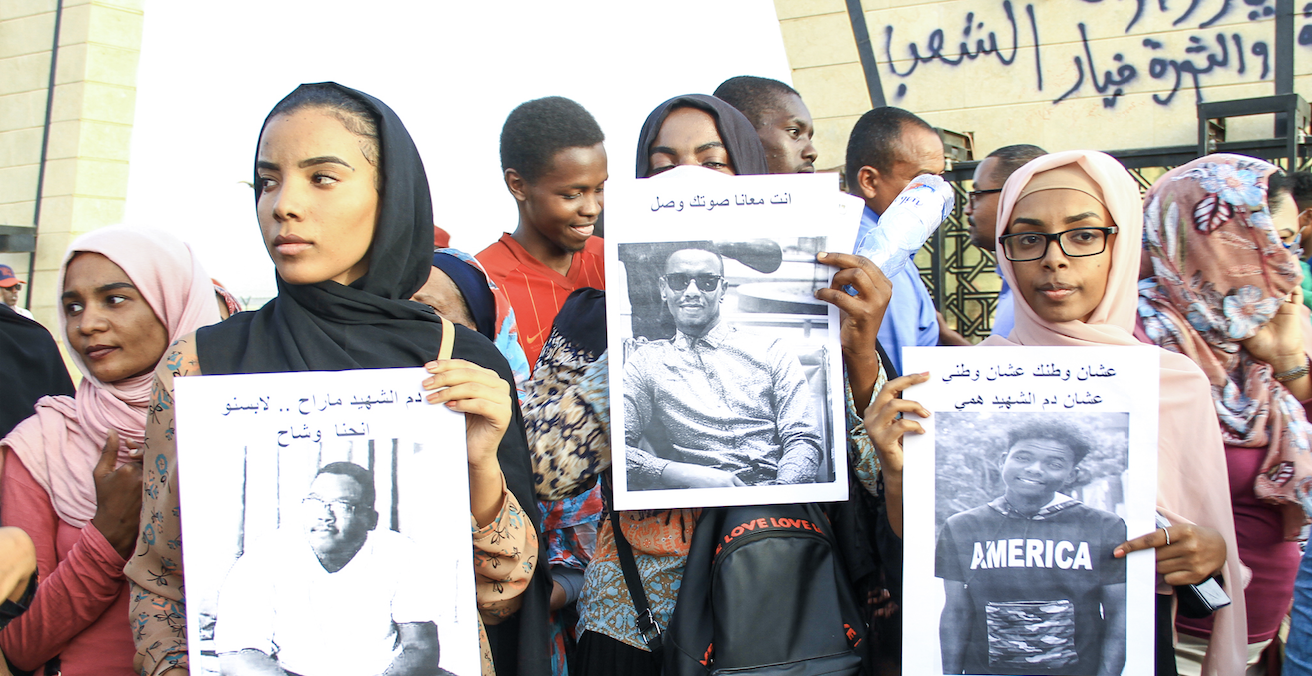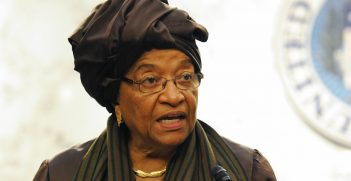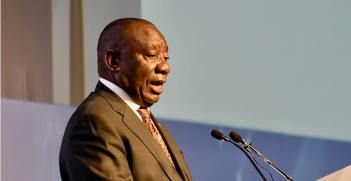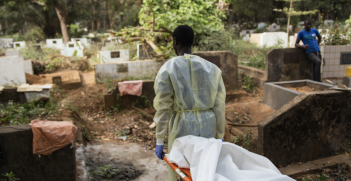Sudan’s Third Revolution: New Wine in Old Bottles?

Popular protests in Sudan have led to the removal of President Omar al-Bashir after 30 years in power. But now he is gone, the Sudanese people remain in the streets pushing for deeper reforms.
The events in the Sudan which led to the fall of President Omar al-Bashir have been hailed as historically important. Protests against the tripling of the price of bread, which began in Atbara in Sudan’s northeast in December, spread across the country and consolidated into an anti-regime movement. After several months, the protestors were finally rewarded for their persistence on 11 April when President al-Bashir was arrested and replaced by a transitional military council headed by General Ahmed Awad Ibn Auf. But the protests have continued and Ibn Auf has since been forced to step aside. In the weeks since the arrest of al-Bashir, the resignation of Ibn Auf and the appointment of General Abdel Fattah al-Burhan as leader of the transitional military council, the Sudanese people have still continued to call for further change.
Revolution and counter-revolution
In 2011, the world witnessed people from Tunisia, Egypt, Bahrain, Libya and Syria rise up against long-standing dictatorships. It was commonly reported that these were the first successful Arab revolutions against autocratic rule. What was lost in this reporting was that the Sudanese had on two prior occasions taken to the streets to bring down military dictators. The Sudanese people are no strangers to revolution, but they are also very familiar with the power of ruling elites to manufacture outcomes that prevent genuine change.
In their persistence, the protestors in Sudan may be considering the fate which befell their northern neighbours in Egypt after the fall of President Hosni Mubarak in 2011. In Egypt, Mubarak being removed from office only translated into the regime manufacturing conditions for things to stay as they were. The rise of President Abdel Fattah el-Sisi has led many commentators to describe Egypt’s current situation as “Mubarakism without Mubarak.” Given the strong influence which Egypt has long had on Sudan, this may be the reason for the tenacity of the Sudanese protestors and their insistence on wide-ranging reforms coming into effect before they agree to return to their homes.
The protestors in Sudan remain in the streets because, despite the pronouncements of al-Burhan to root out al-Bashir’s regime, there is much evidence the deep state, the ruling elite and foreign backers such as Saudi Arabia and the United Arab Emirates are only permitting changes that will allow things to stay the same. The ruling elite manoeuvring to prevent genuine revolutionary change is not new to Sudan. Rather, revolution followed by counter-revolution is a persistent feature of the history of Sudan since independence.
In 1989, Sudan’s third period of democratic rule came to an end when a military coup led by then Brigadier-General al-Bashir took control of the country. Al-Bashir and his army colleagues provided the tanks and guns necessary for a coup of this kind to prevail, but the ideology and power behind the coup were held by the head of Sudan’s Islamist movement, Sheikh Hasan al-Turabi. At the time, for most Sudanese, it mattered little who took over control from the civilian government because its three years of democratic rule had been defined by chaos. The civilian government ousted by al-Bashir and al-Turabi had itself come to power in elections triggered by mass protests that had brought down the sixteen-year dictatorship of another military strong man, Jaafar Nimeiri, who had taken power in a coup in 1969.
Nimeiri wrested power from a civilian, democratically elected government during a bloodless coup in 1969. His junta initially modelled itself on Abdel Gamal Nasser’s Arab Free Officers movement. But Sudan’s Arab socialist project only lasted a few short years before Nimieri, courting Gulf funds and Egyptian support, turned on his communist and socialist allies. Al-Bashir did something similar some two decades later when he arrested al-Turabi and purged elements of the Turabist influence from government and the military. Nimeiri and al-Bashir also share the distinction of being responsible for negotiating agreements that ended long and bloody periods of North-South conflict in Sudan. But Nimieri created the conditions for the war to flare up again in 1983. This time it was in a manner that was even more destructive than in the first iteration that had lasted from 1956 until the Nimeiri backed Addis Ababa peace agreement in 1972. The intensification of the savagery and destructiveness of the conflict occurred under the rule of al-Bashir and al-Turabi. In Darfur, this led to millions being displaced, tens of thousands being killed and al-Bashir being indicted for crimes against humanity. It should be noted that the new interim-leader of Sudan, al-Burhan, is also connected to the notorious Janjaweed militias responsible for many of the crimes committed in Darfur.
The similarities between Nimeiri and al-Bashir’s rule are a reminder that events in a country such as Sudan cannot be understood without reference to long-standing structures and relations of power. Military coups have been either welcomed, or at the very least largely unopposed, because of the ineptitude and corruption, or both, of democratically elected governments. In the past, transitions from civilian to military rule, and the transitions back again, have primarily only resulted in rule being transferred amongst members of the same narrow group of elites.
For the protesters to win, they would also need to understand that change means remaking their country. As a postcolonial country, Sudan was “made” by a colonial power, in this case, Britain, to suit the coloniser’s strategic and economic interests. Like most countries in Africa and the Arab world, Asia and the Americas, Sudan’s geography, political institutions, economic structures, group identities and social configurations were constructed and reconstructed during the colonial period. This was done with the primary aim of maintaining colonial rule, rather than forging a nation or a functioning state. That pattern, and rationale, of rule has been evident since independence. Postcolonialism suggests that unless the legacies of colonialism are adequately addressed, they will continue to hamper efforts at nation and state building, resulting in the kind of instability and violence Sudan has experienced since independence.
Third time lucky?
Despite Sudan’s turbulent history, the story of the protests remains a hopeful one. A long-time dictator wanted by the International Criminal Court for crimes against humanity is now imprisoned in the very same jail in which he sent tens of thousands of Sudanese to be tortured and killed. And, even though al-Bashir and many of his cronies are now incarcerated, and an interim government is in place, the protests continue. These are all positive developments and they are worth celebrating.
The Sudanese people know all too well the power they have to change a government. But they are also very aware of the capacity of the deep state and the ruling elite to wrest back control from the people using both democratic and non-democratic means. The month of April 2019 has been a momentous one for Sudan. As it draws to an end, the political situation remains tense. On one side, the Sudanese people demonstrate a strong commitment to revolutionary change. On the other, the rulers are speaking the language of major change while, with the assistance of Riyadh and Abu Dhabi, leading a revolution from above. The hope is that the events of recent months will drive reform in Sudan and eventually provide the people with a government that can move the country forward from its repressive and bloody past.
Note: The title of this article “New Wine in Old Bottles” is taken from the title of an article on Sudan by Mohamad Salih (1989).
Dr Noah Bassil is a lecturer in Modern History, Politics and International Relations at Macquarie University, Sydney. He is also deputy director of the university’s Centre for Middle East and North African Studies. His research interests include global political economy, colonialism and post-colonialism and the political economy of uneven north-south relations.
This article is published under a Creative Commons License and may be republished with attribution.





